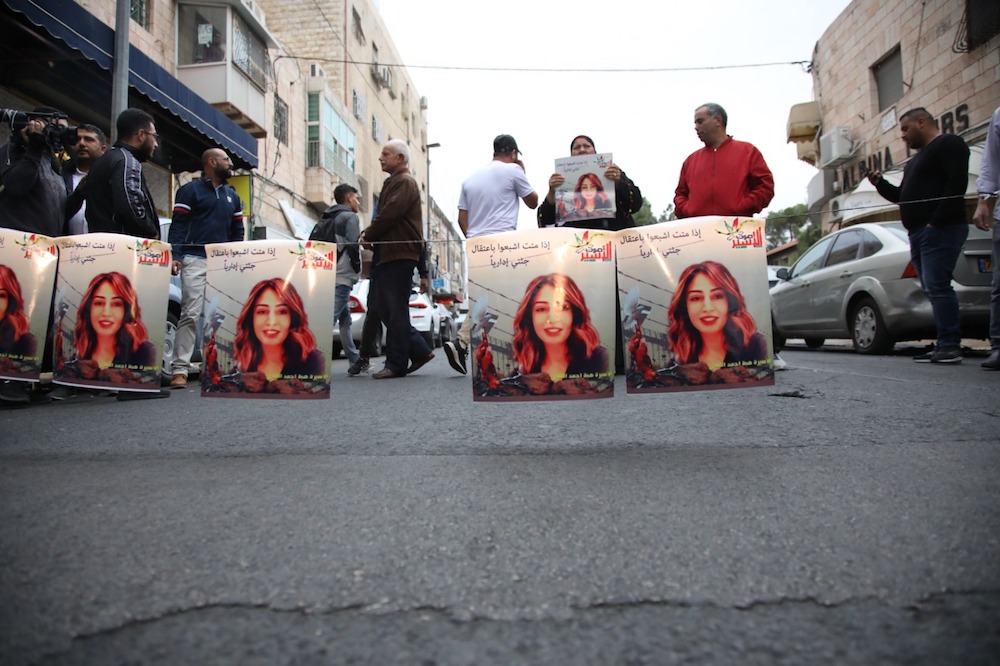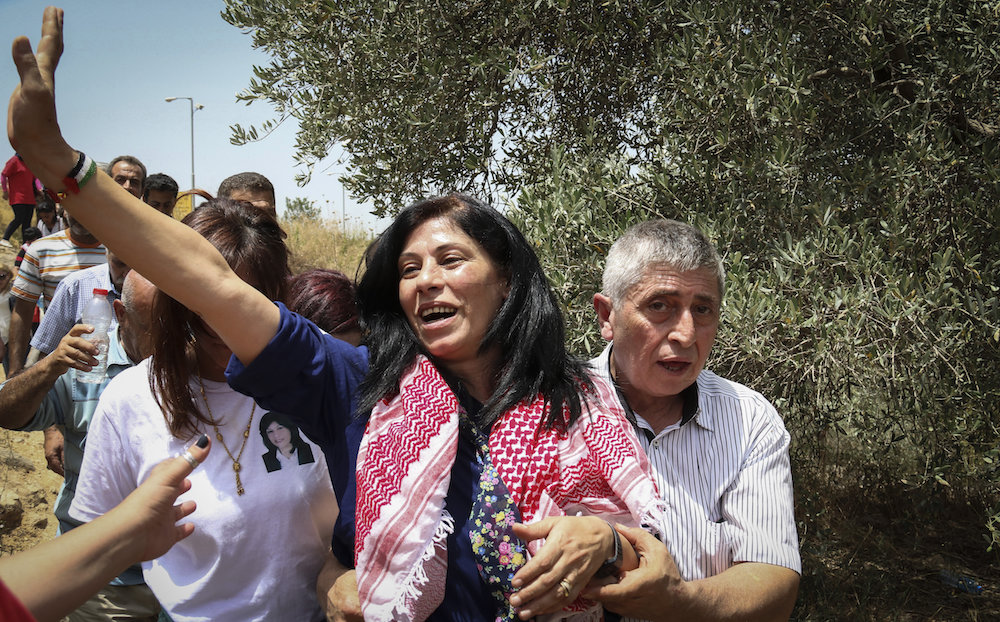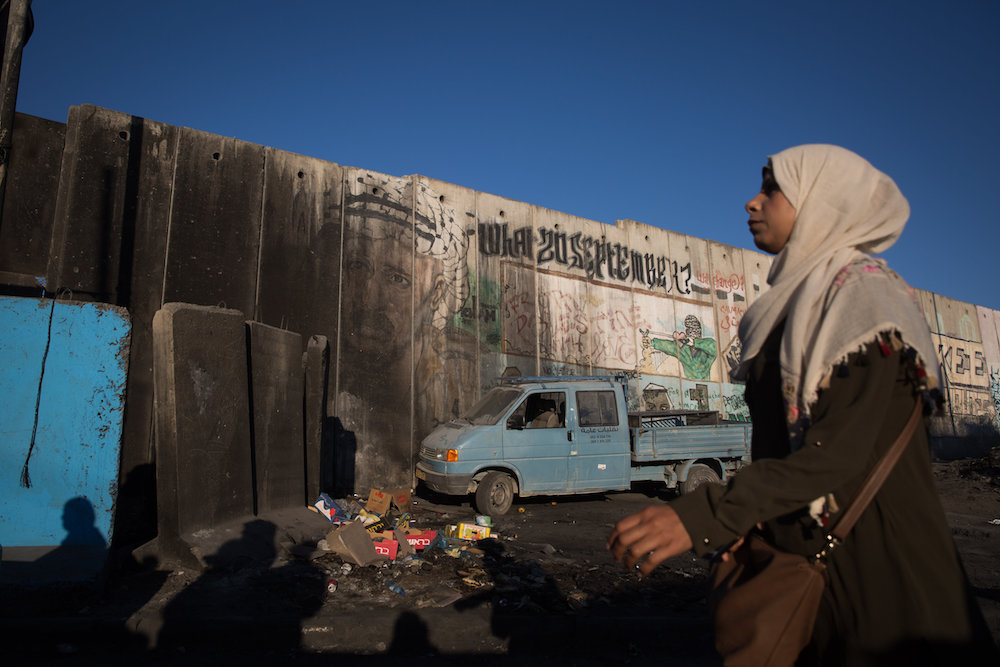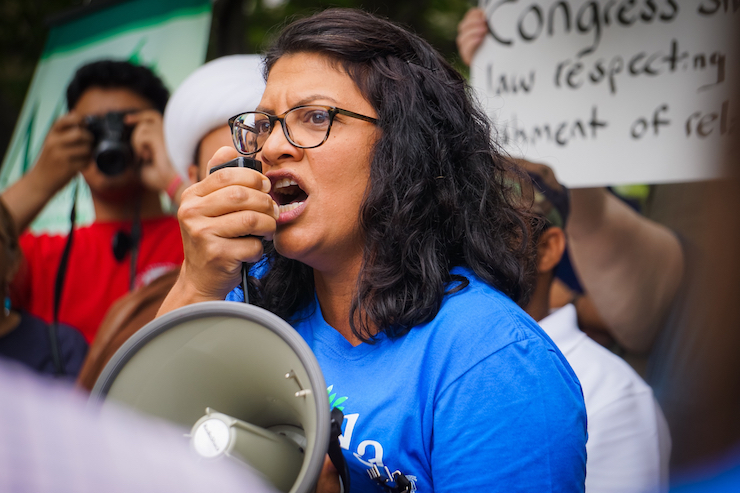Whether dressed in a traditional Palestinian thobe in Congress or marching through streets around the world, 2019 was the year Palestinian women spearheaded the struggle for dignity and justice in Palestine-Israel.
Women have always taken on leadership roles in Palestinian society, but this past year, the convergence of global efforts and local actions added a new depth and nuance to the conversation on Palestinian rights. Women put themselves on the line, linking various forms of patriarchal violence — from colonization, to brutality at the hands of the Israeli military, to gender-based violence — and ensuring that their voices could not be ignored.
The brutal killing of Israa Ghrayeb at the hands of her family members in August sparked outrage across Palestine and the Arab world, prompting women to shatter public taboos and share their own stories of domestic abuse on social media. They demanded all those complicit with Ghrayeb’s death to be held accountable — from members of her family, to the institutions that were supposed to protect her but kept silent. The subsequent grassroots pressure forced the Palestinian Authority to launch an investigation into the killing.
On Sept. 26, partially in response to Ghrayeb’s murder as well as those of other women, thousands of Palestinians marched in dozens of cities across historic Palestine and abroad, under the banner of “no liberated homeland without the liberation of women.” The demonstrations were organized by the Tal’at movement (“rising up” in Arabic) — a Palestine-based group of women founded a year before Ghrayeb’s murder, seeking to redefine the Palestinian national struggle.

“It is Palestinian women who, after years of tireless action against colonialism, can offer a true path to liberation. We won’t stand timidly behind men who craft political agendas and organizing statements totally disconnected from women’s realities or, in fact, the realities of the majority of our people,” wrote Soheir Asaad, one of the organizers. “Violence is not only the experience some women face in their homes or on unlit streets. For years we have endured fear, threats, denial and suppression within organizing spaces, NGOs and political parties at the hands of men who perpetrate violence or who remain silent in the face of violence against women.”
Israel’s oppressive policies — whether directed at Palestinians who are citizens of the state, who live under its military rule in the West Bank and East Jerusalem, or who are under blockade in the Gaza Strip — fuse with patriarchal social structures to target women’s rights and freedoms in destructive ways. Israel incarcerates hundreds of Palestinians every year, primarily young men who are the women’s husbands, sons, and other family members. It conforms to labeling incidents of domestic violence as family disputes or “honor killings” to justify leaving them unresolved. It fails to curb gun violence and criminal activity. It demolishes houses and rips communities apart. It deprives Palestinians of the right to move freely and access adequate healthcare — and much more.
In the face of these efforts to fragment and cripple the fabric of Palestinian society, which segregate communities across space and legal systems, the Tal’at movement has advanced an energizing, intersectional platform to unite many Palestinians across borders, while putting women at center stage. And along with other feminist groups, such as the organization Assiwar, they are launching groundbreaking campaigns to ensure that Palestinian men, including prominent figures within their society, be held to account for misogyny and sexual assault and harassment.

When Israeli forces detained Hiba al-Labadi, a Palestinian refugee from Jordan, in August, the 24-year-old went on a hunger strike in protest of her detention without charge or trial. The Tal’at movement mobilized once again, drawing attention to al-Labadi’s case as well as to the dozens of female prisoners held by Israel.
In November, Israel re-arrested former Palestinian lawmaker Khalida Jarrar amidst a wave of arrests of Palestinians affiliated with the Popular Front for the Liberation of Palestine. She was formerly detained without charge or trial in 2015 and 2017, and most recently released from Israel’s Damon Prison in February after nearly two years in administrative detention. According to Jarrar’s daughter, Suha, the “basis for this continuous harassment is merely because [Jarrar] speaks loudly against the occupation and its arbitrary practices against the Palestinian people.”
While serving as a member of the now-defunct Palestinian Legislative Council, Jarrar distinguished herself as a fierce advocate for prisoners’ and women’s rights. In April 2018, when Israel denied imprisoned minors their right to education by keeping the teacher away for several weeks, Jarrar, who was being held in the same prison, prepared the students for their matriculation exams, which they are able to take while detained. She also provided human rights classes for all female prisoners.

The Israeli Prison System first demanded that Jarrar end these lessons — a move that Addameer, the nonprofit for Palestinian prisoners’ rights, explained as “not only a denial of education, it is also an attempt to curtail female prisoners’ ability to better understand their own oppression.” After pushback from the prisoners, the IPS relented, and allowed Jarrar to resume the classes.
Another Palestinian politician who has been facing intense scrutiny this year, albeit in very different circumstances, is Rashida Tlaib. The first Palestinian American woman to serve as a member of Congress, Tlaib was sworn in as the representative of Michigan’s 13th Congressional District in January wearing a traditional Palestinian dress to honor her mother. “My Yama (mother in Arabic) came to the United States at age of 20,” Tlaib wrote in Elle, explaining her decision, “and just like any immigrant parent, she wants all of her children to succeed, but without giving up on our roots and culture.”
Tlaib’s outfit inspired Palestinian women everywhere to celebrate their culture and heritage online, with the hashtag #TweetYourThobe trending on social media. For Palestinians in the U.S. in particular, whose national identity has been aggressively demonized and even denied in public discourse, it was a powerful moment for the community to assert its pride.
The symbolic gesture soon turned into action, as Tlaib, joined by Rep. Ilhan Omar, organized a congressional delegation to the West Bank and Gaza. Their tentative itinerary included meetings with Palestinian activists and non-profits, as well as international human rights organizations. The purpose, Rep. Omar said in a tweet, “was to witness firsthand what is happening on the ground in Palestine and hear from stakeholders.”
Prime Minister Benjamin Netanayhu’s government, with the encouragement of President Donald Trump’s administration, barred the Democratic lawmakers’ entry into Palestine in August. Israel did, however, offer Tlaib a “humanitarian” permit to allow her to visit her grandmother in the West Bank village of Beit Ur al-Fauqa — a village that has seen decades of land grabs and settlement expansion.
This permit, which Tlaib eventually rejected, was a blatant attempt to de-politicize her: Israel refused to engage with Tlaib as a U.S. leader with the right to move and express her positions freely, and would only allow her entry as a Palestinian subjected to its occupation policies.
Palestinians took to social media once again, this time sharing images and stories of their grandmothers under the hashtag #MyPalestinianSitty. If the earlier social media campaign introduced Palestinian traditions and identity to wider audiences, now, it was placing elder Palestinian women — the matriarchs of society — at the center.
As Nooran Alhamdan wrote on +972 Magazine at the time of the campaign: “My grandmother is not just a beacon of warmth and love. Not just my first best friend. Not just an old woman with a lot of stories. She is a survivor. She is a living preservation of her city. She is the compass that points to justice. She embodies the humanity that so many wish to deny us, Palestinians.”

Tlaib and Omar’s trip would have been “nearly identical” to a 2016 delegation of five Democratic congressmen who also listed “Palestine” as their destination. But the pair, as the first two members of Congress ever to openly support the Boycott, Divestment and Sanctions (BDS) movement, and as Muslim women of color, have been subjected to intense scrutiny since taking office.
Indeed, the backlash faced by both Tlaib and Omar is emblematic of how Palestinian and Muslim women (along with other women of color) have been the main focus of U.S. and Israeli efforts to portray anti-Zionists and anti-occupation activists as anti-Semites, even as white nationalists have been given a free pass for their own anti-Semitism because of their support for Zionism. The fact that both women have been at the forefront of challenging the U.S.’s ironclad relationship with Israel has also rebounded in the form of draconian measures, such as their barred entry to Palestine.
Israel’s ban, however, could not stop the accelerating conversation on U.S. funding to Israel, to which Tlaib has contributed. The potential conditioning of American military aid on Israel’s human rights record has, within the space of a year, become a foreign policy talking point — one that Democratic presidential candidates, not to mention various Washington lobby groups, are being forced to grapple with.
Tlaib’s first year in office, then, has been far more than a symbolic affair. Together with her peers in Congress and the countless Palestinian Americans and allies informing and amplifying her work, Tlaib has helped to upend the staid debate on Israel-Palestine in U.S. politics, pushing Palestinian humanity to centerstage alongside the customary spotlight on Israeli security.
On this front, Tlaib, the women of Tal’at, and Palestinian women in Israeli jails have made kindred inroads into their respective political environments. They are driving the conversation on how Israel’s policies — and the international community’s aiding and abetting of them — affect Palestinians as individuals, families, and communities, and not just as a monolithic, faceless entity. As such, these women have given voice to a reality that their oppressors have sought to deny through physical violence, political suppression, and legal bullying.
History is often written by the powerful. In 2019, Palestinian women, who are doubly marginalized by both Israel’s policies and patriarchal norms in society, not only challenged historical injustices, but also fought to right present-day wrongs. Now they are rewriting the future.

